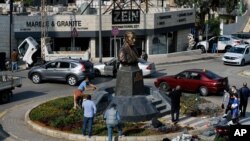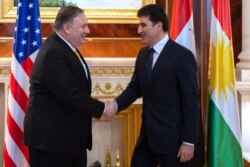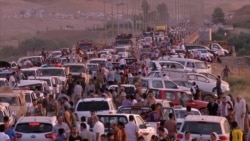Iran has released a series of short propaganda films glorifying the slain Iranian military commander Qassem Soleimani who was killed in a U.S. drone strike a year ago.
The show, however, has offended officials in the neighboring Iraqi Kurdistan region who describe it as an “insult” to their leadership and hundreds of their fighters who have died in the war against the Islamic State (IS) terror group.
Iran’s official news agency, Fars News, on Saturday published a segment of the miniseries online focusing on Soleimani’s role in the fight against IS under a catchier headline than the show’s actual title: “A narrative of saving Iraqi Kurdistan by Haji Qassem Soleimani.”
The real name of the miniseries, however, is “Small Narrations,” which is produced by a pro-government filmmaker named Mohammad Bagher Mofidikia.
The show depicts Soleimani as a hero and appears to exaggerate his role in saving the northern Iraqi Kurdish capital, Irbil, from falling to a seemingly unstoppable IS in 2014. It shows him land from a helicopter in the city on the same night of the IS onslaught to spearhead the fighting efforts.
The fictional work portrays former Iraqi Kurdish President Masoud Barzani as a frantic man desperately trying and repeatedly failing to secure military support from international powers to stop the jihadist advance.
In a scene, the turban-wearing actor playing Barzani is looking at actual photographs of the Kurdish leader with world figures such as Turkish President Recep Tayyip Erdogan, former U.S. Secretary of State John Kerry and Iran’s Supreme Leader Ayatollah Ali Khamenei. He brushes aside all the pictures except for the one displaying Khamenei, which he picks up.
“Do you want to get in touch with the Iranians, sir?” one of Barzani’s top aides asks him in the film. “Do I have another option?” he replies.
‘Weak and worthless’
The Kurdistan Regional Government (KRG) says it has sent an official complaint about the series to the Iranian government because the movie is allegedly funded by Iran’s Islamic Revolutionary Guard Corps (IRGC) rather than being a purely independent initiative.
In 2019, the U.S. designated the IRGC as a terrorist organization for its destabilizing role in the Middle East.
The end credits of the movie give special thanks to a group of persons and entities, including the IRGC.
“As the Department of Foreign Relations, we have informed the [Iranian] Consul General here and expressed our dissatisfaction,” Safeen Dizayee, KRG’s head of the department of foreign relations, told local broadcaster Rudaw.
Iran’s consul general in Irbil, Nasrullah Rashnudi, has denied the allegations that his government’s is behind the film, saying that Iran has had “long-existing relations with our friends in the Kurdistan Region,” according to Rudaw.
Sirwan Barzani, a Kurdish military commander, called the movie “insulting to the Kurdish leadership,” adding that it was the Kurdish peshmerga forces themselves, rather than Soleimani, who were instrumental in defeating IS on the ground.
The episode that pertains to Soleimani’s role in Iraqi Kurdistan is called “Tavakol” (“Trust”).
“The film ‘Tavakol’ aims to humiliate the Iraqi Kurdish leadership, through the figure of Barzani, by portraying them as weak and worthless to their putative regional and international partners, be that the U.S. or others,” said Mohammed A. Salih, a doctoral researcher at the University of Pennsylvania’s Annenberg School for Communication.
“The propaganda film, ‘Tavakol,’ is consistent with prior Islamic Republic of Iran propaganda in two key respects,” Salih told VOA in an email.
“First, the more immediate and notable aim of the film is to commemorate the role and legacy of Qassem Soleimani,” he said. “But the more important aspect of the film is the narrative that promotes the Islamic Republic of Iran as the savior of the entire region, through Soleimani’s superhero-like character, from the Islamic State and Sunni jihadi takfiris in general.”
Iran vs US
While Iraqi Kurdish leaders have acknowledged in the past that Iran was the first country to provide them with ammunition to fight IS, they assert it was the U.S. air support that turned the tide of the conflict in their favor.
Iraqi Kurds have particularly been critical of the lack of immediate assistance from Turkey, their largest trading partner, in their fight against IS.
On August 7, 2014, former U.S. President Barack Obama made a televised speech from the White House, authorizing military action to save Irbil from falling to IS.
“To stop the advance on Irbil, I’ve directed our military to take targeted strikes against ISIL terrorist convoys should they move toward the city,” Obama said, using a different acronym for IS.
“We’re also providing urgent assistance to Iraqi government and Kurdish forces so they can more effectively wage the fight against ISIL,” he added.
As part of a global coalition against IS, Washington continues to provide financial, military and logistical support to Kurdish forces in both Iraq and Syria. In Iraq, the war against IS has so far left nearly 2,000 Kurdish soldiers dead and as many as 10,000 wounded.














